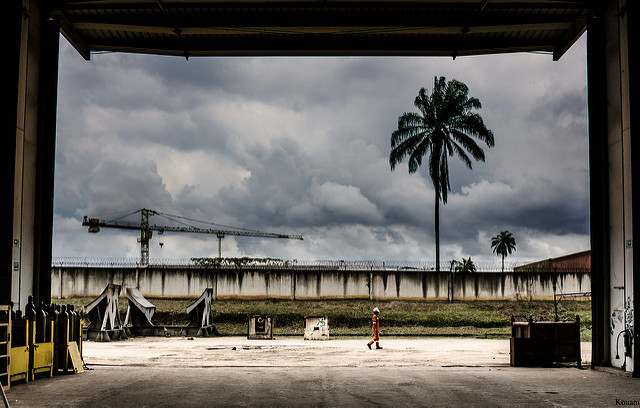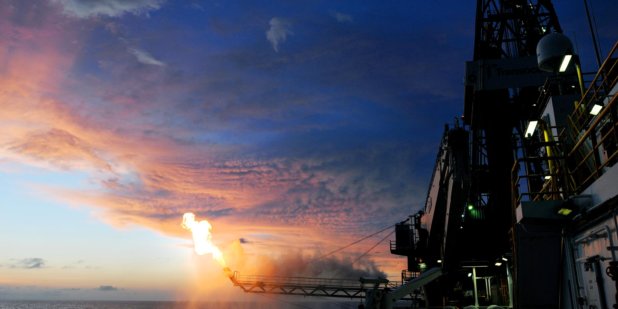- About
- Topics
- Story
- In-Depth
- Picks
- Opinion
- News
- Donate
- Signup for our newsletterOur Editors' Best Picks.Send
Read, Debate: Engage.
Dr. Rüdiger Stöhr is a microbiologist and permanent employee of One Earth One Ocean. He lives in Kiel, Germany. fairplanet spoke with him about the attempts to clean the Niger Delta.
fairplanet: Mr Stöhr, what is the current situation on the ground in the Niger Delta?
Rüdiger Stöhr: When I was in Nigeria for the last time in 2016, the situation had not improved. Many parts of the Niger Delta are severely polluted, stronger in some places and less in other places; but the damage to nature is just devastating. Oil has been produced there since the early 20th century, the entire Niger Delta is very rich in oil. Today, there are mainly the major foreign oil companies represented there: Shell, Chevron, Agip.
Shell has got a special status in the meantime, because Shell does not drill for oil itself anymore, but manages its infrastructure, ie the pipeline network. And the pipelines are still a major concern. They are frequently damaged, and this is due to the systems getting older and also being inadequately maintained. The damage to the pipes thus often occurs as a result of age or material fatigue. In 2015, there were more than 600 reportable oil spills at Agip alone. It can be assumed that the numbers look similar at the other companies.
In addition, there are regularly attempts to tap the pipelines by Nigerian gangs living there in the jungle. They try to refine the oil themselves, thereby causing massive environmental damage. Everywhere oil is offered on the streets, even distilled to gasoline or diesel in illegal backyard distilleries.

What does the ecosystem look like today?
Local people have to buy their drinking water in plastic bottles because all natural drinking water sources are contaminated. After all, it's not just oil that gets into the groundwater, but also some refined oil, like diesel. Those sources of drinking water can not be used anymore.
And if the Niger does not carry much water, for instance outside the rainy season, and new pollutions occur, the water quality of the river also drops rapidly.
As far as the flora is concerned, there is no more growth in those places where there has been massive contamination. Around, in the less contaminated areas, jungles grow.
The big problem are the mangroves. In the rainy season, large volumes of water run in waves down the Niger. Much pollution is washed out then, but also a lot of oil is floated into the mangroves. But the mangroves can not stand oil, they die. However, the mangrove forests with their root system along the river are extremely important for the strength of the soil. The result is that the loss of mangroves causes unprecedented land erosion along the river, with soils being washed out.
As far as the fauna is concerned, there used to be elephant herds that migrated through the delta, and all kinds of wildlife, very rich in biodiversity. There is not much left of that today. I can hardly say anything about the fish; except that I wouldn't dare to eat it. But the locals do, probably due to lack of alternatives.
How do the authorities react to the many problems?
Nigeria is trying to establish an English-style administrative system. As part of that, the chiefs in the local communities will be included in the monitoring and alarm system for oil spills. That's a good idea. However, not all Chiefs only have the common good in mind. And the Chiefs know, the more devastating the oil spill, the more money corporations have to pay to compensate. Therefore delays in reporting the damage are quite common. When we tried to test our oil absorption material, PURE, on-site, there were also chiefs who wanted to get paid several thousand dollars from us for cleaning a lake in their area. We rejected that. Instead, we held press events and met with district governors and environmental organizations.
You work with, among others, Nnimmo Bassey, winner of the 2010 Right Livelyhood Award, and his organization "Friends of the Earth" (www.foei.org).
Yes, working with Nnimmo Bassey is very important to us. He knows the local conditions, so he is kind of a door opener for us. And since we work with him, we were hardly in situations where we were asked to pay bribes.
In 2016, the government of Nigeria has launched the "Ogoni Project" to clean up the Niger Delta. What is it all about?
There was a genocide in the nineties, or more precisely in 1996, of the Ogoni, the indigenous people of the Niger Delta. Due to the massive pollution people had lost their very basis of life, their farms, their fishing grounds. Members of the Ogoni, who called for resistance, were even executed by the then ruling military regime. Nnimmo Bassey's commitment then led the later government to recognize this genocide. The Ogoni project, which was later announced, is seen as a government reparation to the Ogoni. The estuarine delta is to be cleaned and the polluted areas converted to farmland or fishing grounds again.
Officially, the project should have started in 2017, but that did not happen because a new militant group came on the scene. They shot ten policemen and attempted to blackmail the government by threatening to launch further attacks. Since the government does not have the means and the ability to counter it with military strength, it has probably arranged some sort of agreement. However, the cleaning project has not started yet, even now, as the situation seems to have calmed down a bit. Many organizations have been on standby since; they have built or rented huge warehouses to store their equipment and wait for the project to start.
And One Earth One Ocean would be part of it as well?
We have been promised by the government that when the cleanings begin, we will be informed. And we will be ready to go.
You will then have a material at hand that is said to be very promising in cleaning oil spills. What is it?
It's called PURE and it's a kind of wax-based cotton that can absorb up to 8 times its own weight in oil and pollutants. The big advantage of PURE is that it is recyclable as long as its fibre structure is not compressed too much. The fabric looks a bit like cotton candy, with a large inner surface. It absorbs all substances except for water, i.e. oils, waxes, various chemicals. It does not involve a chemical reaction, it is a purely physical absorption. Then you can wring it out or spin it out with a light centrifuge.
PURE floats on the water, making it ideal for absorbing oil films on the water surface. This is important because an oil film prevents the oxygen permeability of the water surface.
You can pack the fabric in bags, in barriers or hoses, attach them behind or next to one another, and thus erect real barriers on the water to absorb the oil.
What does the strategy of One Earth One Ocean look like once the Ogoni project is getting started?
At the moment nobody can say exactly when it will start. But we will certainly start on a small scale, maybe with a lake or a branch of the river. Later, we will hopefully be able to work on larger areas, and then we will certainly need several tons of the PURE substance.
Our strategy, unlike many others involved, is that we do not want to make money from the purges, but that we involve the local communities in the work. We want to pay the communities to do the cleanings themselves. During a demonstration on site, the responsible chief of one of the villages was totally enthusiastic about the PURE fabric. However, most of the communities do not have the financial means to carry out such cleansing themselves. Therefore, they depend on financial support from outside.
Nnimmo Bassey and we especially address the youth chiefs at our visits, so to speak the leaders of the coming generation. Because among young people, the understanding of environmental issues spreads much more than among the older Chiefs.
So you are optimistic about the future of the Niger Delta?
Sure. But the cleanup will take time, certainly several decades, I would say.
For now it will be important that we get the approval to use PURE. It's a lengthy process, and a difficult one too. Because the question of what substance will be the official oil binder in the cleaning of the Delta, is a billion dollar question. We can not and do not want to afford the fees and bribes that are currently required. Our strategy therefore looks a little different. With our presentations on the ground, we want to convince local people of the outstanding capabilities of PURE; and then, if enough people ask for the use of PURE, hopefully the government will give us the approval.
